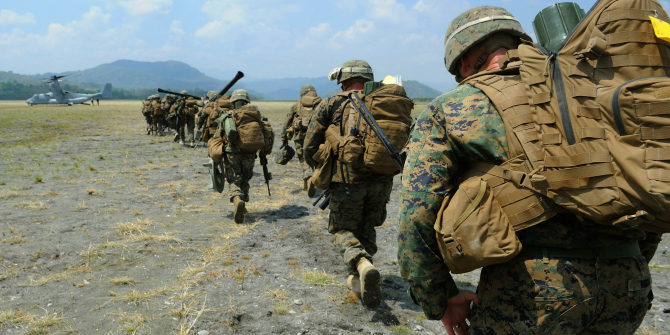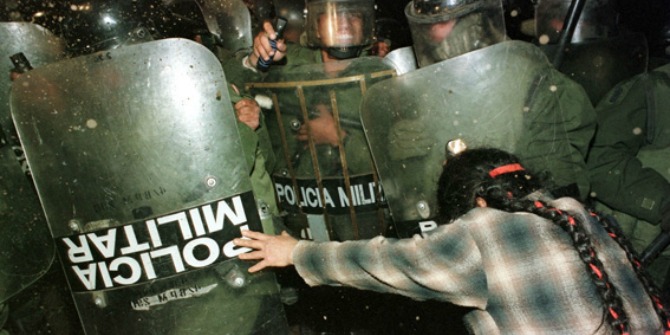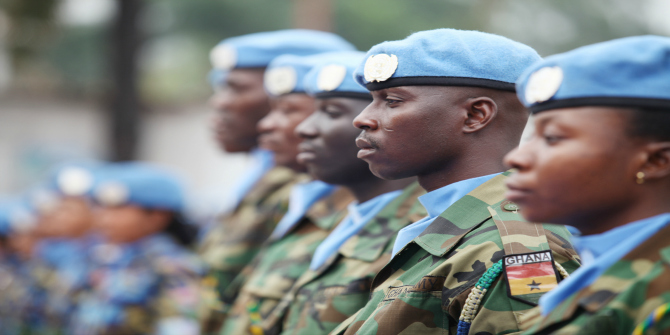 Today, the ideas of Carl von Clausewitz are employed almost ubiquitously in strategic studies, military history and defence literature, but often in a manner which distorts their true meaning. In this book, Thomas Waldman explores Clausewitz’s central theoretical device for understanding war – the ‘remarkable trinity’ of politics, chance and passion. Waldeman displays his formidable scholarly grasp of Clausewitz’s wide-ranging oeuvre, as well as his own talent at depicting it in a gripping, insightful and illuminating manner, writes Ben Mueller.
Today, the ideas of Carl von Clausewitz are employed almost ubiquitously in strategic studies, military history and defence literature, but often in a manner which distorts their true meaning. In this book, Thomas Waldman explores Clausewitz’s central theoretical device for understanding war – the ‘remarkable trinity’ of politics, chance and passion. Waldeman displays his formidable scholarly grasp of Clausewitz’s wide-ranging oeuvre, as well as his own talent at depicting it in a gripping, insightful and illuminating manner, writes Ben Mueller.
 War, Clausewitz and the Trinity. Thomas Waldman. Ashgate. February 2013.
War, Clausewitz and the Trinity. Thomas Waldman. Ashgate. February 2013.
Few thinkers in the fields of politics and strategy are as instantly recognisable as Carl von Clausewitz, the 19th century military historian from Germany best known for his maxim, “War is merely the continuation of politics by other means.” Unfortunately for Clausewitz, owing to the catchiness of this quote, it is by now commonly taken to encapsulate his contribution to political thought. Thomas Waldman’s War, Clausewitz and the Trinity is a convincing antidote to this one-dimensional view, focusing on the conceptual trinity that Clausewitz argued makes up war: passion, chance, and politics. The book is an accessible introductory text for students of politics and war, as well as a research study that aims to provide a clearer depiction of Clausewitz’s thought and its relevance in today’s world.
Chapter 2, focusing on the historical and methodological bases for Clausewitz’s work, is in many ways one of the most compelling of the book. Clausewitz’s rejection of formalistic theories that treat war as a mechanistic phenomenon and aspire to uncover the laws that governing it—yes, that strain of thinking was around already back then—pre-empted the great debates in the 1950s between historically-minded political scientists and those of a ‘scientific’ persuasion who pressed for the adoption of quantitatively driven methodologies to study politics.
Anyone who wants to get a feel for the stakes of this debate would do well to carefully read Waldman’s authoritative depiction of how Clausewitz navigated his way between those espousing the methods of the ‘hard’ sciences, and those advocating the historicised study of individuals and of chance. By pragmatically combining the two approaches — analysing the mechanical aspects of war by deducing generalizable principles, but forever stressing the conditionality of said principles owing to the constant influence of randomness and of free-thinking individuals — Clausewitz came up with powerful methodological insights that Waldman lucidly synthesises: “Theory can teach but cannot prescribe … for [Clausewitz], laws were not applicable in war, as they may be in the sciences. He emphasised the difficulty of developing concrete theory because of the often large distance between cause and effect, the continuous interaction of opposites, the impact of changing conditions and the play of intangible forces that theory could never quite define.”
At the same time, Clausewitz understood theory as having “fulfilled its main task when it is used to analyse the constituent elements of war, to distinguish precisely what at first sight seems confused.” This is a powerful take on the role of theory in social affairs: it can be used to shed light on complexity, and gain an understanding of processes that shape given phenomena; but because the focus of inquiry “is directed at an animate object that reacts” (i.e. humans), there is an inherent limit to what theory can achieve in the face of the sheer complexity that underpins social activity. The essence of sound theory is not that it can be applied in a mechanical fashion, but that it aids judgement. Clausewitz’s insights on the relationship between the universal and the particular are grist to the mill for those who feel that contemporary social science would do well to embrace a less doctrinaire and paradigm-driven approach to research.
Waldman then proceeds to take the reader on an exploratory journey across the analytical terrain on which Clausewitz studied war, beginning with the underlying role of context as providing the essential meaning and social attributes of war. Clausewitz’s insights into the decreasing relevance of history as a guide to the present with the passage of time are gripping, but the fact that Waldman goes on to cover context in its historical, cultural, legal, ethical, political, geographic, technological and economic instantiations brings to mind Prof Colin Gray’s observation that “One can offer too big a picture.”
Waldman then presents Clausewitz’s writings on politics, chance and human passion, respectively, as the three key driving forces that combine, co-opt and co-constitute one another in an impenetrably complex triad that makes up the essence of war.
Each of the three core chapters begins with a historical survey of Clausewitz’s theoretical ancestors, before explaining how Clausewitz’s thinking was shaped by given events in his life, and then exploring the ins and outs of his ideas as well as presenting some of the problems his analyses give rise to. Unfortunately, since all three of Clausewitz’s conceptual pillars are relatively mundane and easily made sense of, the discussion lacks the kind of spark that drives Waldman’s study forward in Chapter 2.
Whilst the book is dotted with historical examples and depictions of specific ideas using actual events, none of these are probed beyond a few lines at most. That is somewhat surprising, insofar as Waldman makes a point in Chapter 2 of explaining Clausewitz’s conviction that history “provides the theorist with a vast reservoir of experience that ‘counts for more than any amount of abstract truths.’” Waldman generally fails to take heed of this important insight, which is doubly unfortunate, because when he does creatively apply Clausewitz to make a substantive point about some aspect of military thinking, it tends to make for an impressive display of how a great thinker’s output can be harnessed to make sense of a contemporary dilemma. For instance, Waldman uses Clausewitz’s work on uncertainty and unpredictability to expose the inherent and indeed timeless flaws of one of today’s influential doctrines about the future of war—Revolution in Military Affairs, which argues that a complete synthesis of the information-communications-technology domain must be developed and applied across the military spectrum (‘Full Spectrum Dominance’) to achieve an overpowering supremacy of intelligence and resources, obviating the possibility of militarily challenging the hegemon. What Clausewitz recognised and Waldman intelligently applies to the contemporary world is the fact that no matter how much information is accumulated, no system of systems can be created until the “problem of converting information into knowledge and knowledge into action” is solved and that “new solutions spawn new problems and new dependencies create new vulnerabilities.” In that passage, Waldman gets at the very heart of the dynamics driving the intelligence game onwards, with an account that casts doubt on the thesis that computers will fundamentally alter warfare, and instead simply add a new ingredient to a dish whose basic recipe remains unchanged. This is gripping, challenging stuff—if only this kind of thinking formed the basis of the book instead of being an anomaly.
War, Clausewitz and the Trinity discusses the research of one of the great post-Enlightenment thinkers on human affairs in a tremendously insightful and accessible manner. Waldman’s book is heartily recommended for those who wish to read a primer on Clausewitz. His is a refreshing perspective on war and politics, because it focuses on intuitively essential — if unquantifiable — elements of social life. Clausewitz’s frank and transparent acceptance of the limits of theory are sobering for any student of the social sciences. By presenting this arguments, Waldman’s book is a convincing remedy for those peddling a simplistic understanding of Clausewitz as an advocate of the primacy of politics over war.
At the same time, the book fails to live up to its potential because of an overly conservative structure. Had Waldman illuminated Clausewitz’s thinking through a series of detailed case studies he could have penned a genuinely ground-breaking study. It is somewhat baffling that Waldman intentionally de-limits his inquiry by expressly stating that his study does not engage in detailed empirical analysis of contemporary conflict. As a result, much of the book’s tone is one to be expected of a deep textual analysis and a meta-survey of Clausewitz’s precursors and later critics. This is entirely acceptable, and makes for a rigorous study. Yet one wonders whether this book could have been much more than what remains an academic treatise appealing to a relatively narrow circle of specialists.
—————————-
Ben Mueller is the International Relations Stonex PhD Scholar at LSE IDEAS. His research focuses on systemic change in international politics. Ben studied PPE at Oxford and then took an MSc at LSE. Prior to his PhD studies he was a Visiting Associate at Boston Consulting Group. Read more reviews by Ben.








Thank you very much Ben for your considered, balanced and detailed review of my book. I hope you don’t mind if I briefly respond to your point about the book’s lack of empirical analysis of contemporary conflict, which I think is an entirely fair point and one about which I am extremely conscious! I think five considerations at least partly explain my decision not to engage in too much empirical analysis:
1. Unfortunately publishers have quite strict word limits, so there simply was not room to provide detailed case studies and retain the remainder of the analysis. Which links to the second reason…
2. While I could have perhaps cut down the discussion on the three separate elements of the trinity, I think this would have been a mistake. I am not sure I entirely agree that each of the three pillars (passion, chance and politics) are necessarily ‘easily made sense of’ and in fact a large part of my motivation in writing the book was to guard against narrow, unbalanced or mistaken conceptions regarding exactly what the three elements are all about. For instance, the ‘new wars’ thesis is driven very much by shallow renderings of the trinity – we can’t, for instance, assume everyone automatically knows what Clausewitz meant by his famous aphorism (war as a continuation of politics) unless we explain the deeper nuances and complexity that lies behind that seemingly simple assertion. I thus felt I had to spend time clarifying such things.
3. While writing the book, I did seriously consider including detailed case studies applying the framework of the trinity to modern conflicts, and in fact wrote 20,000 words on the Iraq War attempting just that. And you are of course entirely correct that Clausewitz – had he been mentoring me – would have encouraged or more likely commanded me to produce such an historical study to bolster my analysis. Even though I did privately conduct an in-depth study of Iraq, I decided not to include it in the book. My main consideration was to avoid the analysis becoming overly associated with highly contested and emotionally charged debates on contemporary conflicts such as Iraq and Afghanistan. In this sense, I didn’t want Clausewitz’s ideas to be tarnished by association with my own strategic critique of contemporary conflicts. I think this largely explains the mistaken interpretations of Clausewitz which emerged in the 1990s filtered through Harry Summers’ “Clausewitzian” analysis of the Vietnam War. (Also, I thought, perhaps naively, that the book might have wider appeal and greater longevity if not tied to an analysis of any particular war).
4. Furthermore, I am of the belief that the trinity is not really intended to be applied in this way: as a rigid framework for assessing any particular war. Rather, as Clausewitz tells us, the trinity serves more the pedagogical function of sensitising and familiarising practitioners, theorists and historians to the essential nature of war in its endless complexity. As I try to explain in the ‘Interactions’ chapter, Clausewitz didn’t want us to think about three neatly compartmentalised aspects of reality applying to war, but rather their intricately interconnected, overlapping and messy unity. That unity and the incredible complexity it entails largely precludes simply dividing war into three neatly comprehensible aspects and analysing them in turn (which any written account would almost inevitably be drawn into doing); what is most important is that the observer – commander or scholar – is acutely aware of the ever-present, dynamic and changeable operation of the three elements. Dogmatically applying the trinity inevitably leads to mistaken understandings: time and again I have seen people attempting this and the result almost always falls short, while simultaneously inviting further misinterpretation and critique (although I admit I am guilty of this in an earlier article on British post-conflict operations in Iraq).
5. Finally, I wanted to preserve the book’s focus and character as a work of textual interpretation and theoretical analysis; perhaps it could be used as the basis for a second volume that applies the framework to conflicts past and present, but again I’m not entirely convinced that this would greatly further my main goal, which was to correct some of the flagrant misinterpretations of the great Prussian’s ideas and in so doing take a first step towards demonstrating Clausewitz’s contemporary relevance.
Thank you for taking the time to read my review and respond in such a thoughtful manner. Your points are entirely sensible, so I will restrict myself to a few reflections in response.
Firstly, I agree with you that Clausewitz’s three pillars are not easily made sense of. That section is in reference to your discussion of context and its various instantiations (cultural, economic etc.); a section that I personally think could have been cut back since the meaning and significance of context is relatively easily described in the context of Clausewitz (pun intended… apologies).
Secondly, you are right that the trinity is not to be applied in a rigid manner as a fixed template for all analyses of war. That of course begs the question – how is it best applied, and what is its conceptual utility?
That is precisely the point I was trying to make: the trinity is a very helpful toolkit for an analyst of war and conflict, but in conjunction with Clausewitz’s idiosyncratic (and to my mind highly relevant) methodological approach to theory must be applied with caution. The one section where you attempt this (RMA), you do so very successfully, showing both how it yields unique insights as well as how it is to be used more as a rough analytical map than a clear-cut ‘model’ or paradigm. So all I really wanted was more of that kind of writing. The analysis of the Iraq War you mention, for instance, sounds thrilling. I would encourage you to pursue this avenue of writing further, because I feel it has the potential to improve our current understandings of how to analyse conflict. I don’t think it will be emotionally charged – after all, the trinity by definition makes for a balanced approach to analysis (balanced between three constituent elements, to be precise).
That would not only add value to our understanding of war and conflict – it could also command a wider audience (due to the topicality of such analyses), and thereby possibly have a positive spillover effect across IR. Of course, as a young researcher I may be somewhat idealistic in this thinking, and the supertanker that is political analysis is too fixated on a neopositivist bearing for it to be budged by one scholar alone.